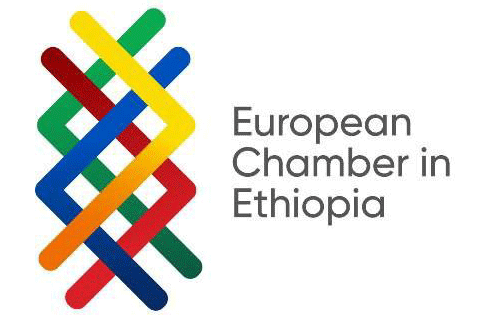
Ethiopia’s Macroeconomic Reset Sparks Record Foreign Exchange Inflows
Speaking to members of the European Chamber in Ethiopia, the Governor of the National Bank of Ethiopia highlights the Central Bank’s ongoing efforts to restructure its operations, prioritizing inflation management and preparing to open the banking sector to foreign competition.

“The reform has doubled the FX reserves in Ethiopia’s banking system from US$ 3.1 billion to US$ 5.9 billion,” H.E. Mamo Mihretu, Governor of the National Bank of Ethiopia.
The European Chamber in Ethiopia (EuroCham) hosted H.E. Mamo Mihretu, Governor of the National Bank of Ethiopia, in its monthly CEO networking event that took place on 21 November 2024. In his opening remarks, Ben Depraetere, Board Chair of the European Chamber in Ethiopia, noted that the chamber represents over 185 members from the European FDI community who have invested in Ethiopia. “Some of our members are among the top five taxpayers in Ethiopia, our companies create thousands of jobs, substantially contribute to foreign currency generation and contribute to the government’s tax collection targets,” he said. “We also count some of the largest global coffee buyers among our members, with one of them buying 10% of the global coffee volume. These European companies are very important for Ethiopia’s coffee sector and economy as a whole.” The Board Chair reflected on EuroCham’s commitment to collaborate with NBE and government Ministries to improve the business climate in Ethiopia, referring to four policy briefs that have been launched by the Chamber focusing on persistent business impediments including FX, customs, tax and access to land. He noted that most of the findings and recommendations in the policy brief on FX have been addressed in the recent NBE directive on FX reforms.
H.E. Mamo Mihretu, Governor of the National Bank of Ethiopia, commenced his address by acknowledging the investment and value addition of European businesses to Ethiopia’s economy. “The interest and participation of the private sector in Ethiopia’s economy, particularly that of European businesses is absolutely critical to grow and make Ethiopia’s economy more competitive,” he said, while appreciating the business community’s continued partnership despite ongoing challenges.
The Governor’s address revolved around three main pillars: (1) a review of recent macroeconomic reforms; (2) an assessment of some of the early results; and (3) an outline of the Central Bank’s forthcoming strategic initiatives.
In July 2024, Ethiopia transitioned to an interest-based monetary policy framework for the first time in its history, aiming to achieve price stability. This reform was built upon earlier measures taken in August 2023 to contain excessive monetary growth and set an explicit inflation objective. Reflecting on the Central Bank’s historic reforms, which were described as comprehensive and well-coordinated, the Governor emphasized that these changes in the monetary regime were as important as the FX regime change that followed. “This is a reform that we take immense pride in as it modernized Ethiopia’s monetary framework and refocused the National Bank’s core task towards controlling inflation,” said the Governor.
The second set of reforms launched over the past year aim to strengthen Ethiopia’s financial sector by encouraging growth, innovation and competition. A key objective is a financial sector that is much more accessible to all segments of society, which will be possible with the entry of new players such as fintechs as well as the use of digital channels and platforms. For the first time, the sector is opening to foreign competition, with legislation currently under parliamentary review and set for enactment next month.
The Governor stated the third reform, transitioning to a market-determined exchange rate, followed extensive internal discussions and preparations. Both the central bank and the broader Government macroeconomic team prepared extensive measures to mitigate any adverse impacts from this reform. He explained that the central bank consolidated nearly 87 directives and regulations into a single, clear and accessible FX regime change directive. The reform is both a policy and regulatory overhaul, streamlining burdensome directives into a single FX policy. It removes the FX surrender requirement, allows exporters to retain 50% of their FX earnings indefinitely and gives banks and exporters the flexibility to negotiate rates. It also lifts import restrictions, opens FX bureaus for small transactions and marks a radical shift from a five-decade old FX policy, with coordinated and interrelated reforms.
The Governor stated that the reform’s immediate impact includes a sharp reduction in the parallel market premium, which fell from nearly 100% to near 5%. “Remitters sending money from abroad now receive bank rates that are as competitive as that offered by Hawala companies. Additionally, FX transaction volumes have surged, with banks purchasing an average of US$ 500 million per month and selling an average of US$ 700 million per month over the past quarter. The reform has doubled the FX reserves in Ethiopia’s banking system from US$ 3.1 billion to US$ 5.9 billion,” he said. With gold proceeds and rising exports, reserves are expected to continue growing. The private banking sector has also largely cleared its previous US$ 500 million net FX liability, ensuring importers’ FX needs are met. Additionally, an interbank FX market is becoming active, with close to US$ 100 million transacted so far – making it possible for banks with surplus FX funds to sell it to those with a shortage of FX funds.
In general, FX inflows in Ethiopia have surged, with some banks’ receipts up over 100%, as intended by the reform. While challenges remain, the trend suggests importers will gradually find it easier to secure foreign currency. “The balance of payments has also been improving; for example, our current account balance, instead of being in deficit as it has been for many years, has turned into a surplus in the first quarter of the fiscal year,” the Governor said. Additionally, companies can now repatriate profits and income from Ethiopia following the exchange rate reform.
Looking ahead, the central bank will remain focused on price stability and financial sector stability, maintaining a tight monetary policy until inflation is under control. While tight monetary measures may temporarily limit credit to the private sector, the Governor noted it is essential to avoid an inflationary spiral. “Our expectation is that inflation will be on a gradually declining trend over the course of 2025,” noted the Governor. The National Bank will also prioritize modernizing Ethiopia’s banking sector, supported by new legislation and improvements in operations and customer service. Consumer protection, transparency, and communication will be enhanced. Lastly, the central bank itself will undergo modernization, with a new proclamation strengthening its autonomy, credibility, and alignment with international standards such as Basel.
“The reforms are an important and transformative reset to the Ethiopian economy in a manner that would increase the participation of the private sector, encourage and support investment and export and recalibrate the way economic policy making is happening in Ethiopia. The result we have seen so far has been tremendously positive and encouraging. For us to succeed in our goal of ensuring price stability, fiscal stability and rising investment, we need the support and collaboration of everyone,” said the Governor.
The Governor responded to questions raised from members of EuroCham, who hailed the reforms as a basis for a sustainable economy. While access to FX has improved significantly, investors said the crunch has now shifted towards local currency liquidity. Questions posed to the Governor centred on the continuation of Franco Valuta imports for FDI and companies in the manufacturing sector, businesses affected by the current reforms, the impact of tightening monetary conditions on economic activities, financial inclusion and the Dire Dawa Free Trade Zone, among other topics.
In his response, the Governor highlighted that the central bank sequenced the monetary policy reform to protect low-income households, learning from other countries’ experiences. While the reform impacted the central bank’s balance sheet and government debt, the Governor said it was necessary to replace an unsustainable system that constrained development. He mentioned that support is being provided to affected businesses, including the provision of working capital loans. The Governor stated that Franco Valuta is restricted for merchandise traders and wholesalers but allowed—as before—for manufacturing investors.
Speaking of the Dire Dawa Free Trade Zone, it was clarified that it is designated as a customs territory outside of Ethiopia and imports and exports to and from the zone will be treated accordingly. The central bank is developing specific banking regulations tailored for operations within the Free Trade Zone.
The Governor reflected that Ethiopia’s formal banking sector serves fewer than 300,000 borrowers, highlighting the need for broader financial inclusion. The central bank is working with fintech and banks to advance digital financial credit and promote wider access to credit and investment. In the anticipated entry of foreign banks into Ethiopia’s banking sector, the governor said, “Opening the financial sector does not mean deregulation. The sector will remain regulated while being opened in a way that benefits the entire financial system, not individual banks. For instance, foreign banks will be encouraged to collaborate with local banks to enhance capacity, innovation, and skills.” The new banking proclamation includes detailed provisions for managing anticipated problems, outlining step-by-step procedures for the central bank to address unforeseen issues in the financial sector. According to the Governor, these measures will be applied judiciously.
EuroCham’s monthly CEO networking event was organized in collaboration with Zemen Bank, Safaricom Ethiopia and Heineken Ethiopia. Reflecting on the Governor’s remarks, a representative of Zemen Bank, which has 130 branches across Ethiopia, said, “Previously, we used to surrender up to US$ 200 million annually to the NBE but with the surrender requirement now removed, we are reallocating it into the private sector. FX is now relatively more available, and we are able to issue LCs to our clients.”
Safaricom Ethiopia’s CEO shared, “We have invested US$ 2.6 billion in Ethiopia and currently have about 3,000 telecom sites operational, with another 1,000 under construction. This allows us to reach 60% of the Ethiopian population, approximately 70 million people, providing access to 4G mobile broadband services—a milestone achieved by few African countries.”
Heineken Ethiopia’s CEO added, “Existing FDIs face unique challenges under these reforms, as international companies often rely on foreign currency funding from their parent companies. The reforms can push such businesses into negative equity.” The use of a foreign currency-to-local currency loan swap was suggested as a potential solution in this area.
EuroCham’s monthly CEO networking event was attended by H.E. Sofie From-Emmesberger, Ambassador of the European Union to Ethiopia, members of the diplomatic community and members of the European business community in Ethiopia.
In conclusion, EuroCham commended H.E. Mamo Mihretu, Governor of NBE and his team for the transparency, communication and engagement with the FDI community. EuroCham and NBE agreed to continue the constructive collaboration through the technical committee established with representatives of both sides, chaired by the Governor.

latest News
EU and EuroCham Sign Grant to Boost Ethiopia’s FDI competitiveness
November 22, 2025
EuroCham Networking Event Discusses New Income Tax Law
October 22, 2025
EuroCham Urges Reconsideration of EUDR Timeline
September 29, 2025
EuroCham Conducted Technical Discussions with Outgoing NBE Governor
September 17, 2025






